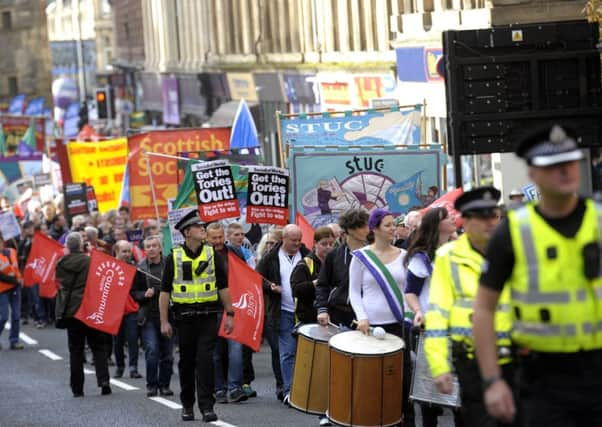Scots take part in 100,000-strong pay protest


The statistics were delivered as tens of thousands of workers joined protests across the UK yesterday, including in Glasgow, calling for an end to austerity and to highlight the need for pay rises.
Public sector workers, including teachers, nurses, civil servants and hospital cleaners, joined protest marches alongside railway workers, postmen and private sector employees.
Advertisement
Hide AdAdvertisement
Hide AdThe main rally was in London but protests were also held in Glasgow and Belfast.
The figures produced by the Scottish Parliament show that the average full-time worker in Scotland has lost out on £2,883 since 2009. The cost to the average part-time worker has been £2,313.
SNP backbencher Jamie Hepburn said: “These figures are damning evidence of how successive Westminster governments have let down working people – while people at the top get richer, ordinary workers are losing out to the tune of almost £3,000.
“Westminster has an appalling track record on working people, with George Osborne’s latest round of cuts hitting 600,000 working families in Scotland and the minimum wage consistently failing to keep up with the cost of living.
“It’s important that powers over employment and the minimum wage are transferred to Scotland, to allow us to take the lead on workers’ rights and ensure that people in Scotland receive a fair day’s pay for a fair day’s work.”
The figures were produced by researchers with the Scottish Parliament Information Centre and show weekly pay has failed to match rises in the consumer price index (CPI).
Yesterday’s demonstrations were organised by the TUC under the banner “Britain Needs A Pay Rise”.
TUC general secretary Frances O’Grady said: “Our message is that after the longest and deepest pay squeeze in recorded history, it’s time to end the lock-out that has kept the vast majority from sharing in the economic recovery.”
Advertisement
Hide AdAdvertisement
Hide AdA Treasury spokesman said: “Under this government we’ve seen the largest annual fall in unemployment, more people in work than ever before, and inequality lower than the average under the previous government, proving that the government’s long-term economic plan is working.
“The only sustainable way to raise living standards is to keep working through the plan that is building a resilient economy.”